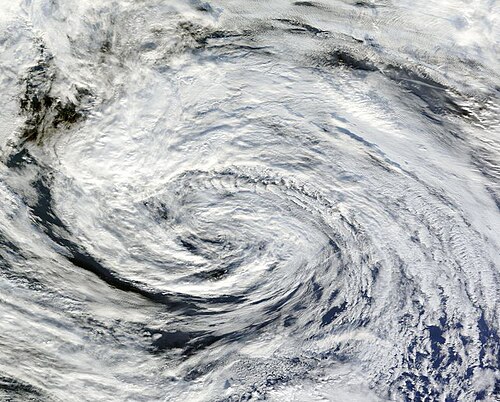Floodnoun
A (usually disastrous) overflow of water from a lake or other body of water due to excessive rainfall or other input of water.
Floodnoun
(figuratively) A large number or quantity of anything appearing more rapidly than can easily be dealt with.
Floodnoun
The flowing in of the tide, opposed to the ebb.
Floodnoun
A floodlight.
Floodnoun
Menstrual discharge; menses.
Floodnoun
(obsolete) Water as opposed to land.
Floodverb
To overflow, as by water from excessive rainfall.
Floodverb
To cover or partly fill as if by a flood.
Floodverb
(figuratively) To provide (someone or something) with a larger number or quantity of something than can easily be dealt with.
Floodverb
To paste numerous lines of text to (a chat system) in order to disrupt the conversation.
Floodnoun
A great flow of water; a body of moving water; the flowing stream, as of a river; especially, a body of water, rising, swelling, and overflowing land not usually thus covered; a deluge; a freshet; an inundation.
Floodnoun
The flowing in of the tide; the semidiurnal swell or rise of water in the ocean; - opposed to ebb; as, young flood; high flood.
Floodnoun
A great flow or stream of any fluid substance; as, a flood of light; a flood of lava; hence, a great quantity widely diffused; an overflowing; a superabundance; as, a flood of bank notes; a flood of paper currency.
Floodnoun
Menstrual disharge; menses.
Floodverb
To overflow; to inundate; to deluge; as, the swollen river flooded the valley.
Floodverb
To cause or permit to be inundated; to fill or cover with water or other fluid; as, to flood arable land for irrigation; to fill to excess or to its full capacity; as, to flood a country with a depreciated currency.
Floodnoun
the rising of a body of water and its overflowing onto normally dry land;
Floodnoun
an overwhelming number or amount;
Floodnoun
light that is a source of artificial illumination having a broad beam; used in photography
Floodnoun
a large flow
Floodnoun
the act of flooding; filling to overflowing
Floodnoun
the inward flow of the tide;
Floodverb
fill quickly beyond capacity; as with a liquid;
Floodverb
cover with liquid, usually water;
Floodverb
supply with an excess of;
Floodverb
become filled to overflowing;
Floodnoun
an overflow of a large amount of water beyond its normal limits, especially over what is normally dry land
Floodnoun
the biblical flood brought by God upon the earth because of the wickedness of the human race (Gen. 6 ff.).
Floodnoun
the inflow of the tide.
Floodnoun
a river, stream, or sea.
Floodnoun
an outpouring of tears
Floodnoun
an overwhelming quantity of things or people happening or appearing at the same time
Floodnoun
short for floodlight
Floodverb
cover or submerge (an area) with water in a flood
Floodverb
become covered or submerged by a flood
Floodverb
(of a flood) force (someone) to leave their home.
Floodverb
(of a river) become swollen and overflow (its banks).
Floodverb
overfill the carburettor of (an engine) with petrol, causing the engine to fail to start.
Floodverb
arrive in overwhelming amounts or quantities
Floodverb
completely fill or suffuse
Floodverb
overwhelm with large amounts or quantities
Floodverb
(of a woman) experience a uterine haemorrhage.
Flood
A flood is an overflow of water that submerges land that is usually dry. In the sense of , the word may also be applied to the inflow of the tide.
Tsunaminoun
A very large and destructive wave, generally caused by a tremendous disturbance in the ocean, such as an undersea earthquake or volcanic eruption. Tsunami are usually a series of waves, or wave train.
Tsunaminoun
(figurative) A large and generally unstoppable surge.
Tsunaminoun
a huge destructive wave (especially one caused by an earthquake)
Tsunaminoun
a long, high sea wave caused by an earthquake or other disturbance
Tsunaminoun
an arrival or occurrence of something in overwhelming quantities or amounts
Tsunami
A tsunami ( (t)soo-NAH-mee, (t)suu-; from Japanese: 津波, lit. 'harbour wave', pronounced [tsɯnami]) is a series of waves in a water body caused by the displacement of a large volume of water, generally in an ocean or a large lake. Earthquakes, volcanic eruptions and other underwater explosions (including detonations, landslides, glacier calvings, meteorite impacts and other disturbances) above or below water all have the potential to generate a tsunami.





































